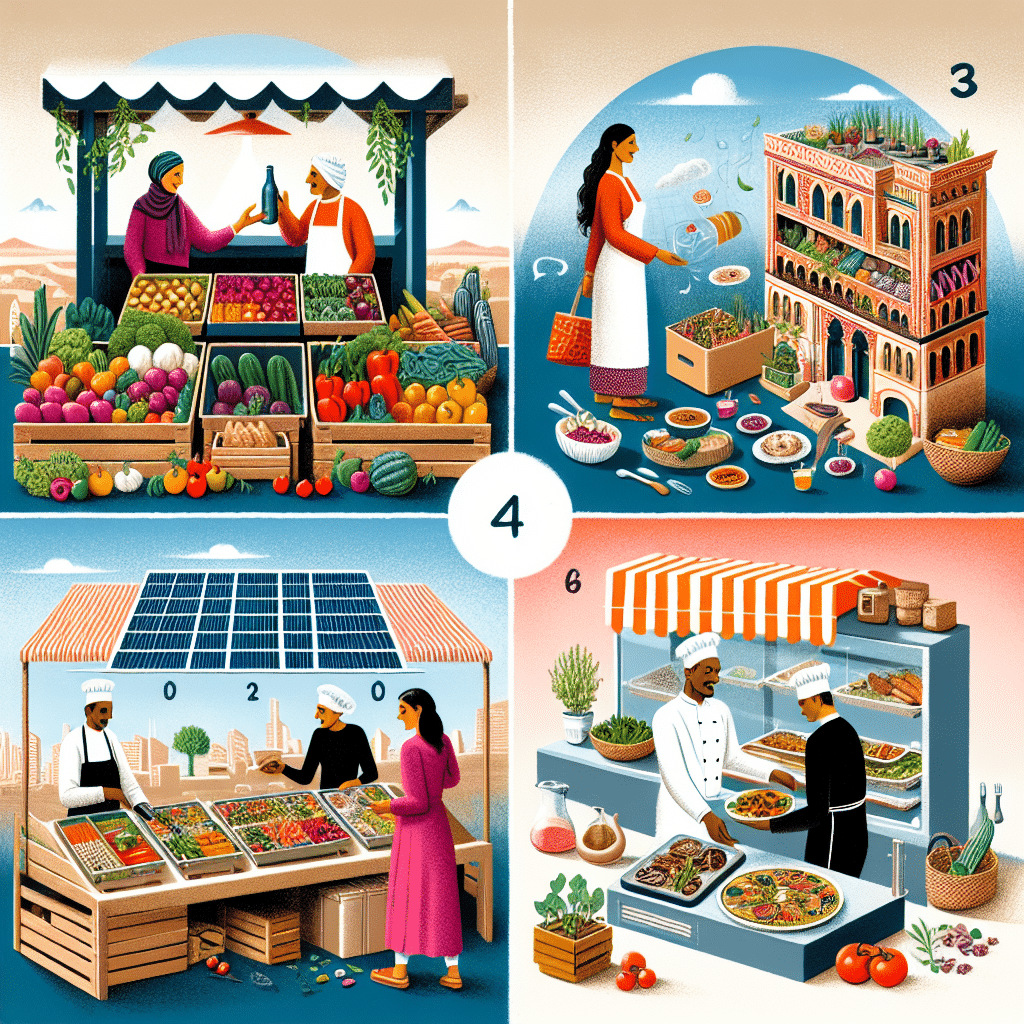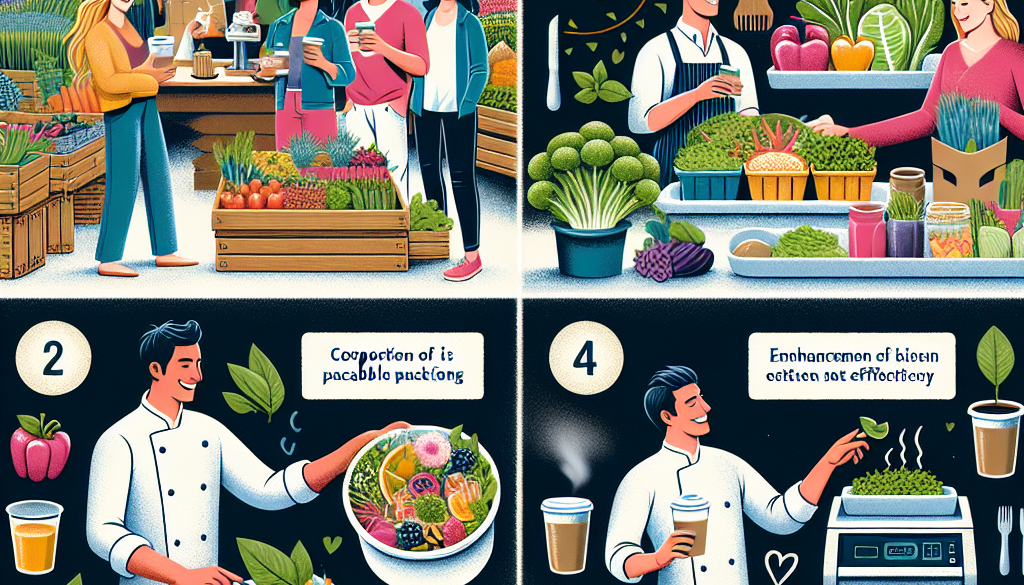4 Trends Shaping the Evolution of Sustainable Foodservice
-
Table of Contents
Sustainable Foodservice Evolution: 4 Key Trends to Watch

The foodservice industry is undergoing a significant transformation as sustainability becomes a central concern for consumers, businesses, and governments alike. With the increasing awareness of environmental issues and the impact of food production on the planet, the industry is responding with innovative solutions and practices. This article explores four trends shaping the evolution of sustainable foodservice, offering insights into how these trends are changing the way we produce, consume, and think about food.
1. Plant-Based Menus and Alternative Proteins
One of the most visible trends in sustainable foodservice is the rise of plant-based menus and alternative proteins. As consumers become more health-conscious and environmentally aware, the demand for meat substitutes and plant-based options has skyrocketed. This shift is not only driven by vegetarians and vegans but also by a growing number of flexitarians who are reducing their meat consumption for health and environmental reasons.
- Restaurants are expanding their menus to include plant-based dishes that are both nutritious and flavorful.
- Food manufacturers are investing in the development of alternative proteins, such as pea protein, soy protein, and lab-grown meats, to provide sustainable and ethical options.
- Case studies, such as Beyond Meat and Impossible Foods, showcase the potential for plant-based proteins to replicate the taste and texture of animal products, making them appealing to a broad audience.
Statistics show that the global plant-based meat market is expected to grow significantly, indicating a sustained interest in alternative proteins.
2. Zero-Waste Initiatives and Circular Economy
Another trend shaping sustainable foodservice is the focus on zero-waste initiatives and the adoption of circular economy principles. Food waste is a major issue, with significant environmental and economic implications. The industry is taking steps to minimize waste at every stage of the food lifecycle, from production to consumption.
- Restaurants are implementing practices such as composting, recycling, and using food scraps creatively in new dishes.
- Suppliers are working on reducing packaging waste and using biodegradable or compostable materials.
- Technology is playing a role in waste reduction, with apps and platforms helping businesses to track and manage their waste more effectively.
Examples of successful zero-waste restaurants and initiatives demonstrate the feasibility and benefits of these practices for businesses and the environment.
3. Local and Seasonal Sourcing
Local and seasonal sourcing is a trend that not only supports sustainable foodservice but also enhances the dining experience. By sourcing ingredients locally and in season, restaurants can reduce their carbon footprint, support local economies, and provide fresher, more flavorful dishes.
- Menus are increasingly designed around seasonal produce, allowing chefs to showcase the best of what’s available locally.
- Restaurants are building relationships with local farmers and producers to ensure a steady supply of high-quality ingredients.
- Consumers are showing a preference for establishments that prioritize local sourcing, as it aligns with their values of sustainability and community support.
Statistics on the growth of farmers’ markets and local food sales highlight the increasing demand for locally sourced foods.
4. Sustainable Packaging and Delivery
With the rise of food delivery services, sustainable packaging has become a critical concern. The foodservice industry is exploring eco-friendly packaging solutions to reduce its environmental impact while still meeting the needs of convenience and hygiene.
- Restaurants and delivery services are adopting biodegradable, compostable, or recyclable packaging materials.
- Innovations in packaging design are helping to minimize waste and improve the sustainability of takeout and delivery options.
- Some businesses are experimenting with reusable container programs to further reduce single-use packaging.
Case studies of companies that have successfully transitioned to sustainable packaging provide a roadmap for others in the industry to follow.
Conclusion
The evolution of sustainable foodservice is being shaped by these four key trends: the rise of plant-based menus and alternative proteins, zero-waste initiatives and circular economy, local and seasonal sourcing, and sustainable packaging and delivery. As the industry continues to innovate and adapt, these trends offer a glimpse into the future of foodservice—one that is more sustainable, ethical, and aligned with consumer values. By embracing these trends, businesses can not only contribute to a healthier planet but also meet the growing demand for sustainable dining options.
ETprotein: Leading the Way in Sustainable Protein Solutions
As the foodservice industry evolves, ETprotein is at the forefront of providing sustainable protein products that cater to the growing demand for plant-based options. Their extensive range of organic bulk vegan proteins, including rice, pea, and various seed proteins, offers a sustainable and allergen-free alternative to traditional animal proteins. With a commitment to quality and purity, ETprotein’s products are ideal for foodservice businesses looking to incorporate sustainable ingredients into their offerings.
ETprotein’s L-(+)-Ergothioneine (EGT) products also represent an innovative solution for enhancing the nutritional profile of food and beverage products. Available in various grades, EGT is a powerful antioxidant that supports health and wellness, making it a valuable addition to any sustainable foodservice menu.
For businesses seeking to align with the trends shaping the sustainable foodservice industry, ETprotein provides the high-quality, environmentally friendly protein solutions needed to succeed in today’s market. To learn more about their products and how they can benefit your business, contact ETprotein and email sales(at)ETprotein.com today.
About ETprotein:
ETprotein, a reputable protein and L-(+)-Ergothioneine (EGT) Chinese factory manufacturer and supplier, is renowned for producing, stocking, exporting, and delivering the highest quality organic bulk vegan proteins and L-(+)-Ergothioneine. They include Organic rice protein, clear rice protein, pea protein, clear pea protein, watermelon seed protein, pumpkin seed protein, sunflower seed protein, mung bean protein, peanut protein, and L-(+)-Ergothioneine EGT Pharmaceutical grade, L-(+)-Ergothioneine EGT food grade, L-(+)-Ergothioneine EGT cosmetic grade, L-(+)-Ergothioneine EGT reference grade and L-(+)-Ergothioneine EGT standard. Their offerings, characterized by a neutral taste, non-GMO, allergen-free attributes, with L-(+)-Ergothioneine purity over 98%, 99%, cater to a diverse range of industries. They serve nutraceutical, pharmaceutical, cosmeceutical, veterinary, as well as food and beverage finished product distributors, traders, and manufacturers across Europe, USA, Canada, Australia, Thailand, Japan, Korea, Brazil, and Chile, among others.
ETprotein specialization includes exporting and delivering tailor-made protein powder and finished nutritional supplements. Their extensive product range covers sectors like Food and Beverage, Sports Nutrition, Weight Management, Dietary Supplements, Health and Wellness Products, and Infant Formula, ensuring comprehensive solutions to meet all your protein needs.
As a trusted company by leading global food and beverage brands and Fortune 500 companies, ETprotein reinforces China’s reputation in the global arena. For more information or to sample their products, please contact them and email sales(at)ETprotein.com today.














